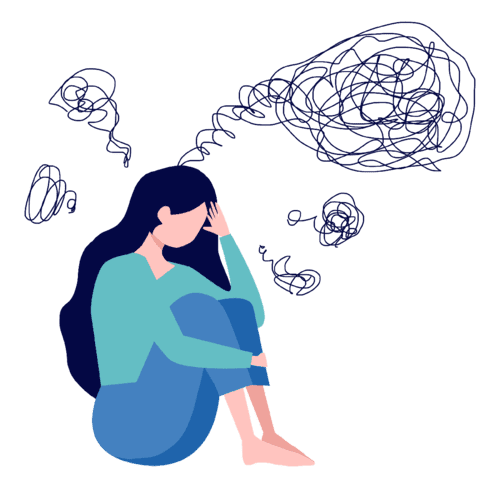Responsibility OCD Assessment
Free Responsibility OCD Assessment

What is Responsibility OCD Assessment?
Responsibility OCD, a subtype of Obsessive-Compulsive Disorder (OCD), involves persistent and distressing fears of causing harm or failing to prevent a catastrophe, even if the possibility is remote. Individuals with Responsibility OCD excessively worry about their actions or decisions leading to negative outcomes for themselves or others. This can manifest as compulsive behaviors aimed at preventing harm, seeking reassurance, or repeatedly checking to ensure nothing went wrong. Assessing Responsibility OCD involves evaluating the intensity and frequency of distressing thoughts and related behaviors, its impact on daily functioning, and employing cognitive-behavioral strategies, such as Exposure and Response Prevention (ERP), to manage and alleviate these distressing obsessions and compulsions.
Who can benefit from this Responsibility OCD Assessment?
The Responsibility OCD Assessment can benefit individuals who experience obsessive-compulsive disorder (OCD) characterized by persistent and distressing fears of causing harm or negative consequences to themselves or others. This assessment aids those who find themselves trapped in compulsive behaviors aimed at preventing these feared outcomes. By evaluating the severity and specific triggers of Responsibility OCD, it helps determine the extent of distress and impairment. The assessment guides mental health professionals in tailoring cognitive-behavioral therapy (CBT), such as Exposure and Response Prevention (ERP), and potential medication approaches, facilitating effective treatment strategies to reduce the anxiety-driven obsessions and compulsions that hinder daily functioning and well-being.
Responsibility OCD Assessment Accuracy
Assessing the accuracy of Responsibility OCD involves evaluating the extent to which obsessive thoughts and resulting compulsions align with reality. It’s crucial to recognize that these obsessions often exaggerate or distort perceived responsibilities. Seeking guidance from a mental health professional, skilled in OCD treatment, is essential to differentiate between genuine responsibilities and irrational fears. A thorough assessment considers the distress caused, impact on daily life, and whether compulsions reinforce fears. Accurate evaluation guides effective treatment like Exposure and Response Prevention (ERP) to challenge distorted beliefs and reduce compulsive behaviors, enhancing overall well-being.
Types of Responsibility OCD Assessment
Intrusive Thoughts:
People with Responsibility OCD often experience distressing and intrusive thoughts about harming others, causing accidents, or being the cause of negative events. These thoughts are irrational and unwanted.
Anxiety and Distress:
Assess the level of anxiety and distress these thoughts cause. Responsibility OCD can lead to high levels of anxiety and emotional turmoil.
Compulsions:
Identify the compulsive behaviors individuals engage in to alleviate their anxiety or prevent the feared outcome. These behaviors might include checking, seeking reassurance, mental reviewing, or performing rituals.
Avoidance Behaviors:
Individuals with Responsibility OCD might avoid situations or activities that trigger their obsessive thoughts. Avoidance can reinforce the obsessions and maintain the cycle of anxiety.
Impact on Daily Life:
Consider how much the obsessions and compulsions interfere with the individual’s daily functioning, relationships, and overall quality of life.
Recognition of Irrationality:
Note whether the person recognizes that their thoughts are irrational or excessive. In Responsibility OCD, individuals often acknowledge that their fears are unlikely, but the anxiety remains distressing.
Handling Responsibility OCD Assessment Issues
Responsibility OCD, also known as “scrupulosity,” is a subtype of Obsessive-Compulsive Disorder (OCD) characterized by obsessive concerns about moral or ethical issues, religious beliefs, and fear of making mistakes or being responsible for harm. Here are some strategies to help handle responsibility OCD assessment issues:
- Recognize the Obsessions: Understand that responsibility OCD involves irrational and exaggerated thoughts related to responsibility and harm. Acknowledge that these thoughts are driven by anxiety and are not necessarily reflective of reality.
- Practice Mindfulness: Mindfulness techniques can help you observe your thoughts without judgment and reduce the emotional power of obsessions. This can help you detach from the distressing content of your obsessions.
- Challenge Cognitive Distortions: Identify and challenge cognitive distortions, such as black-and-white thinking, catastrophizing, and perfectionism. Ask yourself if there’s evidence to support your fears and whether you’re interpreting situations realistically.
- Exposure and Response Prevention (ERP): ERP is a cornerstone of treating responsibility OCD. Under the guidance of a therapist, gradually expose yourself to situations that trigger your obsessions while refraining from engaging in compulsions. This helps desensitize the anxiety associated with your obsessions.
- Set Time Limits for Assessments: If you tend to engage in extensive mental or behavioral rituals to assess your level of responsibility, set time limits for these assessments. Gradually decrease the time you spend on them to break the cycle of compulsions.
- Accept Uncertainty: Recognize that seeking certainty in moral or ethical matters is often not possible. Practice accepting uncertainty and making decisions without absolute reassurance.
- Limit Reassurance-Seeking: Avoid seeking reassurance from others or from repetitive rituals. While seeking reassurance might provide temporary relief, it reinforces the cycle of OCD.
- Develop a Hierarchy: Work with a therapist to create a hierarchy of situations that trigger your responsibility obsessions. Start with less distressing situations and gradually progress to more challenging ones as you build your tolerance.
- Self-Compassion: Be kind to yourself and practice self-compassion. Understand that nobody is perfect, and making mistakes is a natural part of being human.
- Professional Support: Seek help from a therapist who specializes in treating OCD, particularly responsibility OCD. A therapist can guide you through ERP and provide tailored strategies for managing your specific obsessions.
- Stay Engaged: Engage in activities that bring you joy and a sense of accomplishment. This can help divert your focus from the obsessions and provide a sense of normalcy.
- Medication: Consult a psychiatrist to discuss the potential benefits of medication, especially if your responsibility OCD is causing significant distress and impairment in your daily life.
Remember that progress in managing responsibility OCD takes time and consistent effort. Working with a qualified mental health professional who specializes in OCD treatment can significantly enhance your ability to manage these issues effectively.

